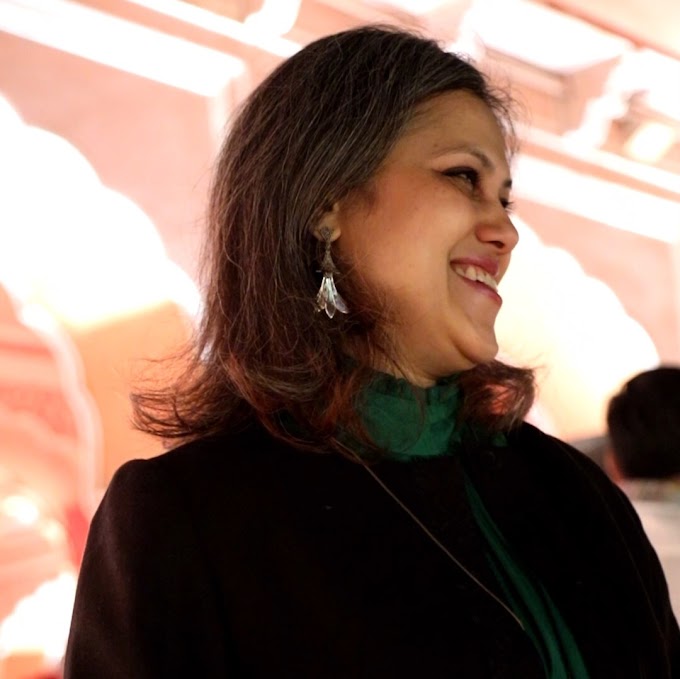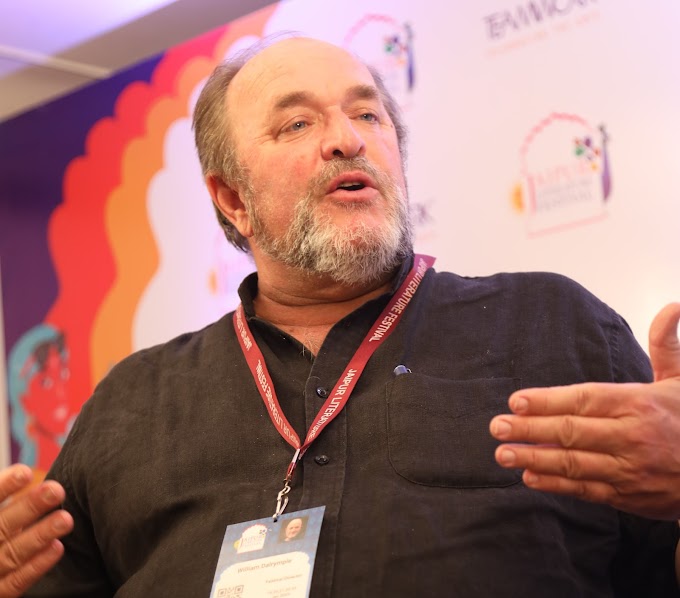At the Jaipur Literature Festival, the air is thick with the scent of books, and the ambience resounds with the echoes of debates and dialogues. It's a gathering of the brightest minds from around the world, where discussions delve into the most crucial and pressing issues of our time. It's a platform where the exchange of ideas is free and fair, and voices that would otherwise go unheard can finally be heard.
I remember last year, as I took the stage, the lights drowning
down upon me, bathing me in its hostile embrace. My heart was pounding in my
chest as I mustered up the courage to utter out that which made many in the
audience uncomfortable. The bombs had gone off, and wrath would follow, but I
believed in the beauty of our shared dreams, and I was determined to do what I
believed was right.
This year, I stood up once again, with the same determination
and fearlessness as last year. I asked another question that was deemed
"the only useful thing" to ask by somebody I hold in high regard. And
once again, the response was mixed, with some applauding my bravery while
others criticized my audacity. But that is the beauty of the Jaipur Literature
Festival - it provides a platform for vital discussions and debates, where
voices can be heard, and where the exchange of ideas is free and fair.
It is easy to sit back and complain about the state of the
world, about the injustices and inequalities that exist. But it takes a great
deal of courage to actually do something about it. To stand up and ask the
uncomfortable questions, to engage in vital discussions and debates, to push
for change. The festival may provide the platform, but it is up to us to seize
the opportunity and make a difference.
The youth of India form a significant chunk of the population,
and are a curious and inquisitive lot. They have grown up in a rapidly changing
socio-political environment and are eager to make a positive impact on our
country. But, the older generation, often in positions of power and influence,
is seldom open to our ideas and opinions. This has resulted in a staggering
generation gap in Indian politics and society, with the youth being excluded
from mainstream public discourse.
India’s march from Nehru to Modi, its painstaking struggle for
independence and the present raging battle for secular and liberal character of
our republic are not unfamiliar terrains for our youngsters. The contention is
against the narrative business, which is seemingly within the control of a few
elites and heavyweights. So, the youngsters of India, regardless of their
individual thoughts, beliefs and opinions, are expected to take extreme
political positions on a permanent basis. But I may be getting ahead of myself.
PM MODI
— Bharat Reddy (@BharatR34278312) February 7, 2023
Look at Nehru vision and tell andhbakths to learn something pic.twitter.com/IIxdCBZsc1
From the liberal end, one is expected to bat for human rights
and secular principles. So far so good. But the moment one takes up a cause
like the reinvigoration of ancient Indian temples and traditions, all eyes from
the Left turn red and a blatant safforonisation follows. This pleases our
masters on the so-called Right side of political spectrum but when the same
youngster is appalled at the renaming and shaming of existing glories such as
the erstwhile Mughal Garden, the frown follows from the other end too.
Cow Hug Day! @TheSouthfirst cartoon #CowHugDay #ValentinesDay pic.twitter.com/n6foXm6rwV
— Satish Acharya (@satishacharya) February 9, 2023
In the vitriol of this divide what both sides fail to see is
that the youth of India do not really give a damn to what caricatures you paint
of them. Their future is at stake, it’s a young country and a vibrant crowd
that is being vehemently silenced by the boomers.
According to the Census of India 2011, the youth of India make
up a whopping 64 per cent of the population. This is a huge number, and it is
imperative that their voices are heard and their opinions are taken into
consideration. Yet, in many public gatherings and forums, the youth are often
overlooked and not given a chance to ask the difficult questions that they want
answers to. It is all the more shameful that more than half of our country is
simply unqualified to enter a Legislative Assembly, and when you talk of the
Parliament that number is closer to 65 per cent. And all of this is according
to the last census which was more than a decade ago. The numbers coming out of
the ongoing Census will be more shocking.
At present what we have in front of us is 30 per cent of our
population driving the entire country’s policies and narratives when they have
themselves outlived their span and have far crossed the retirement age. The
prevailing generation gap in India has been exacerbated by the monopoly of
boomers in public discourse. They are not receptive to the perspectives and
opinions of the youth. This has resulted in a lack of engagement and exchange
between the two generations, which can have serious consequences for the future
of India.
It is important for the youth of India to ask uncomfortable
questions to the stalwarts at public gatherings. This not only shows their
curiosity and engagement but also challenges the status quo. Asking difficult
questions can lead to a more informed public discourse, and it can also
challenge the opinions and perspectives of those in power. This can help to
bridge the generation gap and bring the youth into the mainstream public
discourse.
Good morning from #India
— Janakiraman (@periyakulam) October 1, 2020
to all my #Twitter friends.
-
Generation gap -> always amazing for old and young ! pic.twitter.com/ZYSbAnb1FC
One key area we urgently need to work on is increasing youth
participation in politics and policymaking. Boomers will need to get over the sanskari mindset that a youngster must
always be polite and not point to the follies of the elders. That sort of
outdated mentality is preventing India from marching onwards and competing with
the global superpowers. The solutions to the biggest problems of this age will
come from youngsters though there can be no denying the fact that we will learn
a great deal from the able guidance of our elders. But, looking down upon
youngsters and closing all doors for their active participation in national
discourse, has gone on for far too long.
The politicians, in particular, should stop looking at
youngsters as only voters and activists who add to the crowds at their rallies.
As a young nation, it is imperative that we allow independence of thought and
action to our youngsters and open avenues for them that are truly in line with
the proportionality of our population.
As I stand here, as this magnificent celebration of literature
and art closes its 2023 edition, I am reminded of the power of words. The power
of words to inspire, to challenge, to bring about change. And so, I urge each
and every one of you to use your voice, to engage in vital discussions and
debates, to ask the uncomfortable questions. Let us continue to push for
change, to work towards a better future for all.
Don’t be scared, break the chains and do what your heart wants
you to. This is a powerful thought and I hope you keep that in mind when you
are audience to a gathering where something seems off and you want to ask a
question but are unsure how to go about it. Just do it!





